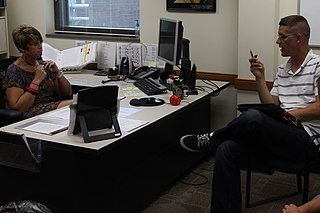
Vocational education is education that prepares people to work as a technician or to take up employment in a skilled craft or trade as a tradesperson or artisan. Vocational Education can also be seen as that type of education given to an individual to prepare that individual to be gainfully employed or self employed with requisite skill. Vocational education is known by a variety of names, depending on the country concerned, including career and technical education, or acronyms such as TVET and TAFE.

Apprenticeship is a system for training a new generation of practitioners of a trade or profession with on-the-job training and often some accompanying study. Apprenticeships can also enable practitioners to gain a license to practice in a regulated occupation. Most of their training is done while working for an employer who helps the apprentices learn their trade or profession, in exchange for their continued labor for an agreed period after they have achieved measurable competencies.
IEK is a Greek abbreviation name for the Ινστιτούτο Επαγγελματικής Κατάρτισης.
The European Centre for the Development of Vocational Training (Cedefop) is an agency of the European Union. Established in 1975, Cedefop is headquartered and located in Thessaloniki region, Greece, and has a Brussels office. Cedefop is the acronym of its French title, Centre Européen pour le Développement de la Formation Professionnelle (C.E.DE.FO.P.). Cedefop supports the development of European vocational education and training (VET) policies and contributes to their implementation.
Apprentices mobility is the movement of students and teachers in vocational education or training (VET) to another institution inside or outside their own country to study or teach for a limited time. The term is usually used in the context of European Union (EU) policy.

Career counseling is a type of advice-giving and support provided by career counselors to their clients, to help the clients manage their journey through life, learning and work changes (career). This includes career exploration, making career choices, managing career changes, lifelong career development and dealing with other career-related issues. There is no agreed definition of career counseling worldwide, mainly due to conceptual, cultural and linguistic differences. However, the terminology of 'career counseling' typically denotes a professional intervention which is conducted either one-on-one or in a small group. Career counseling is related to other types of counseling. What unites all types of professional counseling is the role of practitioners, who combine giving advice on their topic of expertise with counseling techniques that support clients in making complex decisions and facing difficult situations.
The Swedish National Agency for Education is a Government agency in Sweden that oversees the Swedish public school system for children and adults.

Non-formal learning includes various structured learning situations which do not either have the level of curriculum, syllabus, accreditation and certification associated with 'formal learning', but have more structure than that associated with 'informal learning', which typically take place naturally and spontaneously as part of other activities. These form the three styles of learning recognised and supported by the OECD.
The Leonardo da Vinci programme is a European Commission funding programme focused on the teaching and training needs of those involved in vocational education and training (VET). The programme is part of the European Commission's Lifelong Learning Programme 2007–2013 and aims to build a skilled and mobile workforce across Europe.
In England, learning and skills refers typically to post-compulsory education and training, provided by further education and sixth form colleges, schools with sixth forms, local authority and adult education institutions, private and voluntary sector providers, offender learning, and workplace learning including Apprenticeships and other employer-facing initiatives. The learning and skills sector is vital to increasing productivity, economic competitiveness and sustainable employment in the UK

eCOTOOL was an international project undertaken through the European Union's Lifelong Learning Programme, specifically the Leonardo da Vinci programme. As such, the eCOTOOL project primarily dealt with initial and continuing vocational education and training (VET) in the European Union.

WACOM was an international project undertaken through the European Union's Lifelong Learning Programme, specifically the Leonardo da Vinci programme. As such, the WACOM project primarily deals with initial and continuing vocational education and training (VET) in the European Union.
The Vocational Qualification Transfer System (VQTS) model is a proposal for a structured description of work-related competences. The core elements are the Competence Matrix and the Competence Profiles. A Competence Matrix displays competences structurally in a table according to core work tasks in a specific occupational field and the progress of competence development. Competence Profiles are formed from individual parts of this Competence Matrix. In the context of ECVET the VQTS project sought to support the transnational mobility of learners. A Competence Matrix can be used for the development of qualifications, training programmes, and job profiles, as well as for human resource planning, the allocation of qualifications to the Qualifications Framework, and for developing higher permeability between vocational education and higher education.
DISCO – European Dictionary of Skills and Competences is a structured vocabulary for the description of skills and competences in different contexts such as labour market, education, and training, and the recognition of qualifications. DISCO provides a skills and competences classification that is neither linked to occupations nor to qualifications. Instead it functions as a thesaurus of skills and competences which is based on existing international standards and classifications and thus represents a terminological basis for the description of skills and competences, occupations as well as personal skill profiles and CVs, job vacancies, and job requirements or for describing curricula, courses, Diploma and Certificate Supplements or learning outcomes in general. Available in ten language versions, DISCO is meant to support transnational comparability of competences acquired in an educational or work context throughout Europe.
The National Skill Development Agency (NSDA) attempts to increase Employability of Youth in India. It is a fully autonomous body, constituted on the approval of Union Cabinet of India. On May 9, 2013, the Union Cabinet gave its nod to form NSDA.
NCFE is an Awarding Organisation and registered educational charity that is nationally recognised by the qualification regulators for each country of the United Kingdom. NCFE is regulated by the Office of the Qualifications and Examinations Regulator in England, the Welsh Government in Wales and the Council for Curriculum, Examinations and Assessment in Northern Ireland.
The UNESCO-UNEVOC International Centre for Technical and Vocational Education and Training is one of seven UNESCO institutes and centres working in the field of education. The International Centre is located at the United Nations Campus in Bonn, Germany and is financed by both UNESCO and the German government. UNESCO-UNEVOC is the International Centre for connecting UNESCO Member States worldwide to develop and strengthen technical and vocational education and training (TVET). The Centre works in the context of UNESCO’s mandate for Education for All and Education for Sustainable Development. It undertakes its activities through a global network of TVET institutions comprising departments of ministries, national TVET bodies, Universities, and nationally leading training centers.
VOCEDplus is a free international research database about tertiary education, maintained and developed by staff at the National Centre for Vocational Education Research (NCVER) in Adelaide, South Australia. The focus of the database content is the relation of post-compulsory education and training to workforce needs, skills development, and social inclusion.
A qualifications framework is a formalized structure in which learning level descriptors and qualifications are used in order to understand learning outcomes. This allows for the ability to develop, assess and improve quality education in a number of contexts. Qualifications frameworks are typically found at the national, regional, and international level.
Online credentials for learning are digital credentials that are offered in place of traditional paper credentials for a skill or educational achievement. They are directly linked to the accelerated development of internet communication technologies, the development of digital badges, electronic passports and massive open online courses (MOOCs).





